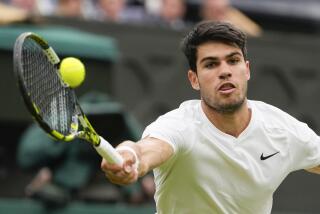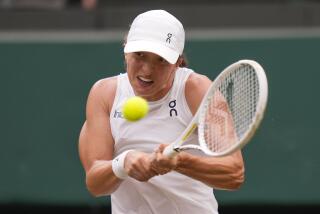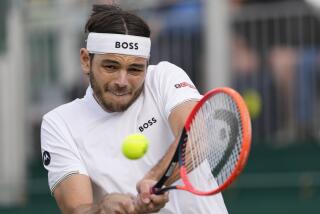U.S. Is a Big Zero in Tennis
- Share via
WIMBLEDON, England — There’s a deadening heat wave in London this early summer, but it’s not like it makes you lapse into mirage and spot vultures overhead
The last of that once-dominant species spied the birds not so long after high noon on Monday, and pretty soon people in the air-conditioned press center had to start rifling through record books.
After all, once Shenay Perry’s unruly nerves constrained her tennis arsenal and sabotaged her first major fourth-round berth to a 54-minute loss, everyone knew Wimbledon would have its usual 16 quarterfinalists and a highly unusual American total of zero.
That phenomenon hadn’t occurred since 1911, when the Englishwoman Dorothea Lambert-Chambers wound up winning the title over Englishwoman Dora Boothby, and when a Cambridge student from New Zealand, Anthony F. Wilding, took the second of his four straight Wimbledon men’s singles titles, four years before he died at 31 in World War I.
The phenomenon hadn’t occurred in any of the four grand slam tournaments since the Australian Open of 1976, back when players such as Jimmy Connors, Chris Evert, Martina Navratilova and Billie Jean King didn’t even enter, while Americans Stan Smith and Charlie Pasarell bowed out in the round of 16.
Somehow, 30 years later, three rounds featuring 14 American women and 10 American men had shaken out only one American woman, Perry, 21, and she did admit that lent jitters to her jitters.
“Well, if I could explain to you how nervous I was, I don’t think anyone, you know, could feel how I felt on the court,” Perry, ranked No. 62 in the world, said.
Observers could grasp the concept from her 6-2, 6-0 loss to No. 7-seeded Elena Dementieva, as Perry barely made it to the net and repeatedly mashed groundstrokes too long in dropping the last 10 games.
“Next time it’ll be easier for her,” said her coach, Ola Malmqvist.
“It’s just another hump I’ll get over,” Perry said.
When Dementieva’s last backhand winner skittered past Perry, the clock read only 1:08 p.m., with still 15 matches remaining in the fourth round, still five days from the women’s final and six days from the men’s, with no Americans one year after Americans claimed three-fourths of the finalist slots.
By nightfall, the remaining draws did include surprising winners as well.
They boasted the sport’s first Chinese grand slam quarterfinalist, Na Li, 24, ranked No. 30, who toppled the 10th-seeded, 17-year-old French Open sensation, Nicole Vaidisova, 4-6, 6-1, 6-3.
Asked if she ever envisioned raising the trophy, she said, “I’ve kind of had this dream, but I have to drop it because the more you expect, probably in return you have more disappointment.”
Mario Ancic, the No. 7-seeded Croatian, withstood five sets with Serb Novak Djokovic, won, 6-4, 4-6, 4-6, 7-5, 6-3, and started mulling a match with No. 1-ranked Roger Federer of Switzerland, whose 45-match grass win streak dates back to a first-round loss, in 2002, to Ancic.
Two other former champions are still in the mix. Russia’s Maria Sharapova (2004) struggled but prevailed in three sets and Australia’s Lleyton Hewitt (2002) didn’t struggle too much and prevailed in four sets.
There still stood, among others, two familiar Belgians (Justine Henin-Hardenne and Kim Clijsters), plus a Finn (Jarkko Nieminen), a 34-year-old Swede (Jonas Bjorkman), and, for the first time, a Cypriot, the surprise Australian Open finalist Marcos Baghdatis.
Just no Americans, and no British either, thanks to Baghdatis. After several London newspapers desperately offered up the 44th-ranked Andy Murray as a salve for the Kingdom’s World Cup woes, he disintegrated against the 16th-ranked Baghdatis, 6-4, 6-2, 7-6 (7-2).
Once indoors, his news conference felt like winter.
“That wasn’t good,” the 19-year-old said somberly. “Got to be up there with the worst this year that I’ve returned. That was really not good. I never missed so many second-serve returns, especially off my backhand.... I hardly got myself into any rallies.”
His downcast voice greeted the extension of Britain’s familiar old men’s singles title drought from 70 years to at least 71, but in wiping out Roddick in three sets, Murray had helped unveil an unfamiliar new drought: Americans have claimed only two quarterfinal spots and zero semifinal spots in the three grand slams this year.
“It’s quite a disappointment,” Federer said, sympathizing with the downtrodden after his own three quick sets in nice sunshine.
More to Read
Go beyond the scoreboard
Get the latest on L.A.'s teams in the daily Sports Report newsletter.
You may occasionally receive promotional content from the Los Angeles Times.










